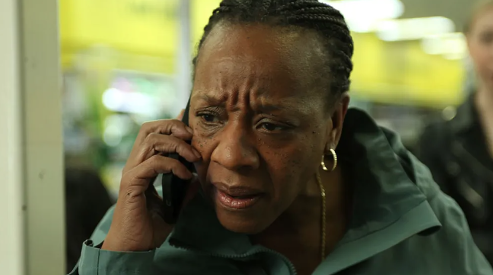Hard Truths

Cast: Marianne Jean-Baptiste Michele Austin, David Webber, Tuwaine Barrett, Elliot Edusah
Director: Mike Leigh
97 mins
Reuniting with Marianne Jean-Baptiste, Mike Leigh makes a welcome return to contemporary film-making with a searing portrait of a woman on the brink. Hard Truths stands as Leigh’s comprehensive statement on the historical epoch just ended, one in which the social contract that underpins his collaborative methods and collectivist politics was thoroughly, perhaps permanently undermined. All that has built up in the last 15 years comes pouring out in a torrent from the mouth of a character Pansy (Marianne Jean-Baptiste). Pansy is an amalgamation of the small ways in which we’ve all been changed since the Covid-19 pandemic: haunted by death, bone-weary in her body, sick of her family and mistrustful of strangers, no longer sure how to act in public, and perpetually at someone else’s throat. It could be the way they dress, the way they look or the way they look at her. She picks fights with a salesgirl at the furniture showroom, the checkout girl at the supermarket, and the dental hygienist attempting to clean her teeth, if she’ll sit still with her mouth open for long enough (good luck with that). At the dinner table, she complains about the “cheerful grinning people” soliciting for charity outside the shops (“I can’t stand them”), and spares a word of bitter judgment for the onesie a neighbour has picked out for her baby (“What’s a baby need pockets for?”). Riding on the adrenaline of confrontation, Jean-Baptiste gives a hilarious performance that becomes harrowing whenever you consider what it would be like to be opposite one of Pansy’s rants – or to deliver it. She carries tension all through her body – Pansy, who throughout the film just wants to get some rest, wakes up screaming every single time she falls asleep, and when she talks on the telephone she seems to curl her whole body around it, like a giant clenched fist. She seems to have undiagnosed OCD and agoraphobia – she sprays down the sofa and scours it with real rage, and can’t stand the pigeons in the yard, as if she’s afraid of her sanctuary being sullied or penetrated. She hounds her son, a 22-year-old failure (played by Tuwaine Barrett) who wears noise-blocking headphones and has an avid interest in aeroplanes), for his lack of initiative; she berates her builder husband Curtley (David Webber) for wearing shoes in the house, with a contempt that, in a stylised characterisation typical in Leigh, gives a heightened and actorly edge of contempt to the archetype of the wife and mother, sick and tired of performing uncompensated domestic labour.
50 years into Leigh’s career as a chronicler of the British underclass, this is his first film with a Black lead – and indeed an almost all-Black ensemble, from the aunties in Pansy’s sister Chantal’s (Michele Austin) salon, where she lends tart banter and a warm ear to complaints about no-good men, to Chantal’s daughters, whose upward mobility is complicated by imposter syndrome and subtle undermining at work. The scene in which Kayla (Ani Nelson) gets an earful for pitching coconut-free moisturiser is a highlight: the modern lifestyle industry is a new venue for Leigh to explore female neuroses and falsely cheery bourgeois microaggressions, two of his richest comic subjects. What a joy it is to be back in Leigh’s London after such a long absence – to see it from new angles, made accessible to his loving gaze by a cast of fresh collaborators. Because of the way he works with his actors, developing their characters through extensive improvisations before he writes them into the script, we invariably people first as collections of exterior quirks at which to marvel, whose root causes we can perhaps guess at as well, if we’re curious and empathetic enough. Pansy’s problem is not that she’s a Black woman in a racist world– or not only that. She carries that weight differently than, say, Chantal does, which is perhaps the difference between being the older and the younger daughter of a non-white single mother with a hard life and high expectations. Her chronic physical and existential pain is culturally and individually specific, and her marriage is a cause as much as a symptom: though gentle giant Moses is close to non-verbal, Curtley is stoic as well, and whether his silence is stoicism and endurance, cowed passivity, a trauma response, or even a kind of emotional punishment, it contributes to the profound loneliness that has Pansy thrashing around so. Pansy has something of a breakthrough when she and Chantal make a Mother’s Day visit to their mum’s grave, followed by an awkward extended-family visit to rival the one in Leigh’s High Hopes, albeit the tone is low-key and mournful rather than bitter and farcical. It’s a hinge point in the film leading to a largely silent final movement in which the marital battle of wills between Pansy and Curtley, for so long held in equilibrium by the constant of her anger, begins to shift, for better or worse. Hard Truths is a study of an extreme personality and the people it bounces off as it moves ever forward driven by the same gust of momentum; only late in the film do you realise you’ve actually been watching an unfolding breakdown approaching a moment of crisis.
The film ends at a moment chosen particularly for its narrative ambiguity, for being the time when the responsibility for telling Pansy’s story could be most suggestively given over to us as the viewer. The challenge, such as it is, of watching a Mike Leigh film is of being a person who is giving sustained attention to others – and Pansy is among his most demanding and rewarding tests.